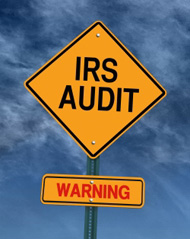 Photo Credit: Val Goretsky
Photo Credit: Val Goretsky
By Dennis Spinelli, CPA, Director - Tax Services
Budget deficits and other fiscal concerns combined with challenging economic conditions continue to place pressure on federal and state governments to generate increased revenue through tax collections. A principal vehicle for tax revenue generation is conducting field examinations of filed tax returns, otherwise known as tax audits. As a result, it's not a question of if your bank will face a tax audit, but when -- and will you be prepared?
The IRS Examination Process
Most banks that are "selected" for an IRS examination are done so via a random process. There are also situations that may trigger selection. Examples of these include filing an amended tax return or carryback claim, prior tax audit experience which resulted in a tax assessment, or any unusual elements reflected in a filed tax return (e.g., acquisition or tax accounting method change).
The initial communication of tax audit selection is done through a letter which requests the scheduling of a kick-off meeting at the bank's location. At the initial meeting, the IRS auditor (Revenue Agent) will explain the taxpayer'sr ights and discuss the logistics of the audit process, including the expected date of completion. The bank will provide any information that was requested in the introductory letter, such as General Ledger chart of accounts, Board minutes, etc. If the bank is represented by a tax advisor, an executed Power of Attorney will be given to the auditor if it hasn't been provided previously. The audit process will then commence with periodic requests for information, as well as follow-up requests based on information provided during the process.
What does the IRS generally focus on?
Some common areas of scrutiny during audits of bank tax returns are:
- Fringe Benefits -- Assuring that all taxable fringe benefits and perquisites were properly reported as compensation on executives' W-2 forms.
- Non-Accrual Loan Interest Income -- Ascertaining if income is reported properly in accordance with IRS guidelines.
- Bad Debts -- Verifying proper deduction based on facts and allowable methods.
- Other Real Estate Owned (OREO) Expenses -- Determining deductibility of expenses incurred to maintain OREO properties.
Additionally, it is quite possible that the IRS will requestt he personal income tax returns of the bank's top five executives for inspection. This review is usually cursory and does not represent a full tax audit.
Tax Audits in New Jersey
New Jersey's tax audit procedure is similar to the process undertaken by the IRS. One difference is that the N.J. statute of limitation is four years as opposed to three years. Typically, the state representative will audit one of the years in the open statutory period, and any adjustments to that period are extrapolated and assessed for the other "open" time periods, thereby resulting in a four-year assessment. New Jersey audits encompass all taxes (income, payroll and sales/use tax) but the significant majority of time and focus is on sales/use tax. The most prominent area of tax assessment comes from the review of purchases from out-of-state vendors for which no sales or use tax was paid. Another frequent area of concentration and potential exposure is the review of data processing expenses, a component of New Jersey's sales tax law that has seen much change over the years and remains very complex.
Summary
While an IRS or New Jersey tax audit can be stressful and require time and expense, there are other important ramifications depending on the ultimate result of the audit. If the IRS imposes adjustments upon conclusion of an audit, it is quite likely that they may decide to select future tax returns for auditing. On the other hand, an audit that results in little or no adjustments could alleviate the bank from being targeted for tax audits in subsequent time periods. Assistance from an experienced tax professional can be extremely beneficial throughout the process, helping you prepare for an audit and providing valuable guidance that can lead to a better outcome for the bank.
To learn about our Tax Services, email WhatsYourRisk@acxellrms.com or call 877-651-1700.
Comments |


Add a comment
- Required fields are marked with *.

OnCourse Staff
OnCourse Staff
The OnCourse writing staff work to keep you informed about the most pertinent financial industry news of the moment
OnCourse Staff's Posts



